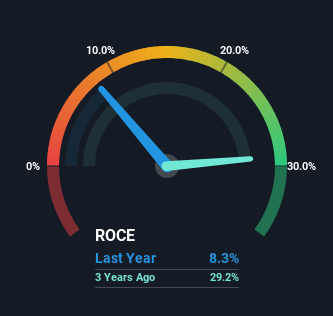- China
- /
- Electronic Equipment and Components
- /
- SHSE:688475
Here's What's Concerning About Hangzhou EZVIZ Network's (SHSE:688475) Returns On Capital
If we want to find a potential multi-bagger, often there are underlying trends that can provide clues. Typically, we'll want to notice a trend of growing return on capital employed (ROCE) and alongside that, an expanding base of capital employed. Put simply, these types of businesses are compounding machines, meaning they are continually reinvesting their earnings at ever-higher rates of return. Having said that, from a first glance at Hangzhou EZVIZ Network (SHSE:688475) we aren't jumping out of our chairs at how returns are trending, but let's have a deeper look.
Understanding Return On Capital Employed (ROCE)
Just to clarify if you're unsure, ROCE is a metric for evaluating how much pre-tax income (in percentage terms) a company earns on the capital invested in its business. To calculate this metric for Hangzhou EZVIZ Network, this is the formula:
Return on Capital Employed = Earnings Before Interest and Tax (EBIT) ÷ (Total Assets - Current Liabilities)
0.083 = CN¥493m ÷ (CN¥7.9b - CN¥2.0b) (Based on the trailing twelve months to March 2024).
So, Hangzhou EZVIZ Network has an ROCE of 8.3%. On its own that's a low return, but compared to the average of 5.3% generated by the Electronic industry, it's much better.
View our latest analysis for Hangzhou EZVIZ Network

Above you can see how the current ROCE for Hangzhou EZVIZ Network compares to its prior returns on capital, but there's only so much you can tell from the past. If you'd like to see what analysts are forecasting going forward, you should check out our free analyst report for Hangzhou EZVIZ Network .
What Does the ROCE Trend For Hangzhou EZVIZ Network Tell Us?
When we looked at the ROCE trend at Hangzhou EZVIZ Network, we didn't gain much confidence. To be more specific, ROCE has fallen from 27% over the last five years. Although, given both revenue and the amount of assets employed in the business have increased, it could suggest the company is investing in growth, and the extra capital has led to a short-term reduction in ROCE. And if the increased capital generates additional returns, the business, and thus shareholders, will benefit in the long run.
On a side note, Hangzhou EZVIZ Network has done well to pay down its current liabilities to 25% of total assets. Since the ratio used to be 75%, that's a significant reduction and it no doubt explains the drop in ROCE. Effectively this means their suppliers or short-term creditors are funding less of the business, which reduces some elements of risk. Since the business is basically funding more of its operations with it's own money, you could argue this has made the business less efficient at generating ROCE.
What We Can Learn From Hangzhou EZVIZ Network's ROCE
While returns have fallen for Hangzhou EZVIZ Network in recent times, we're encouraged to see that sales are growing and that the business is reinvesting in its operations. And the stock has followed suit returning a meaningful 8.1% to shareholders over the last year. So while the underlying trends could already be accounted for by investors, we still think this stock is worth looking into further.
If you'd like to know more about Hangzhou EZVIZ Network, we've spotted 2 warning signs, and 1 of them can't be ignored.
While Hangzhou EZVIZ Network isn't earning the highest return, check out this free list of companies that are earning high returns on equity with solid balance sheets.
Valuation is complex, but we're here to simplify it.
Discover if Hangzhou EZVIZ Network might be undervalued or overvalued with our detailed analysis, featuring fair value estimates, potential risks, dividends, insider trades, and its financial condition.
Access Free AnalysisHave feedback on this article? Concerned about the content? Get in touch with us directly. Alternatively, email editorial-team (at) simplywallst.com.
This article by Simply Wall St is general in nature. We provide commentary based on historical data and analyst forecasts only using an unbiased methodology and our articles are not intended to be financial advice. It does not constitute a recommendation to buy or sell any stock, and does not take account of your objectives, or your financial situation. We aim to bring you long-term focused analysis driven by fundamental data. Note that our analysis may not factor in the latest price-sensitive company announcements or qualitative material. Simply Wall St has no position in any stocks mentioned.
About SHSE:688475
Hangzhou EZVIZ Network
Engages in the manufacture and sale of smart home products in China and internationally.
Flawless balance sheet with moderate growth potential.
Market Insights
Community Narratives



